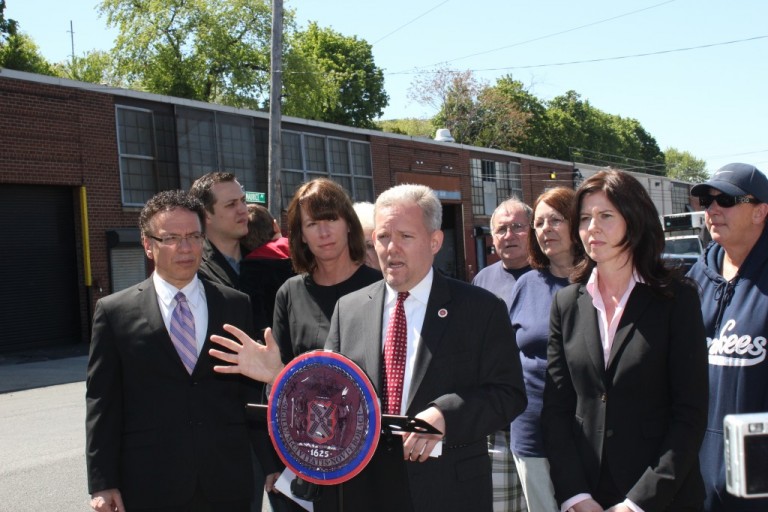
Councilman Jimmy Van Bramer, center, was the only Queens representative to land an A on a human rights report card issued last week by the Urban Justice Center, while Councilwoman Elizabeth Crowley, right, received a C-grade. File photo
Only one borough recorded a lower human rights record than Queens, according to the Urban Justice Center’s annual report card surveying the city.
The Human Rights Project, which serves as one of 10 initiatives to come out of the Urban Justice Center, released its sixth annual human rights report card grading the entire City Council, basing its findings on legislative trends, votes and sponsorship and legislation. Only one member of the Queens delegation made the top-13 citywide to receive an A grade, and the entire borough scored second to last citywide overall in regards to human rights with a B-minus.
City Councilman Jimmy Van Bramer (D-Sunnyside) was the only Queens representative to see his grade in the A range, with Councilman Daniel Dromm (D-Jackson Heights) and Ruben Wills (D-Jamaica) not far behind with a B-plus. Some of the borough’s lowest human rights scorers included City Council members Peter Vallone Jr. (D-Astoria), James Gennaro (D-Fresh Meadows), Eric Ulrich (R-Ozone Park) and Elizabeth Crowley (D-Middle Village), all of whom landed a C.
The report plugged Van Bramer, Dromm and Wills as the top three of the borough’s 14 human rights records because of different pieces of legislation they introduced on the topics of government accountability, health rights and workers’ rights.
The Queens delegation also scored second-lowest of the five boroughs in the seven categories of human rights legislation featured in the report card such as housing rights (C), workers’ rights (B), criminal and juvenile justice (B), health (C-plus) and government accountability (B), the report said.
“Human rights principles call for discriminatory outcomes to be addressed, even if there is no proof of discriminatory intent,” said Shani Jamila, director of the Human Rights Project. “Employing this type of frame means we can call on the city to proactively address disparities that can be tied to city policies.”
It was not the first time Van Bramer and Dromm passed the Urban Justice Center’s human rights exam as both lawmakers topped the Queens delegation’s scores in last year’s survey as well. They were both at the top of the list, the center said, because of their legislative records in regards to workers’ rights, criminal and juvenile justice, health disability rights, government accountability and voting rights.
“We are pleased to see our legislators taking action to promote human rights,” said Nicole Bramstedt, policy and outreach coordinator of the Human Rights Project. “We look to the new Council to enhance this work. New Yorkers’ quality of life depends on it.”
As for disability rights, the borough scored the lowest in the city with a C-grade, with more than half the delegation (nine of 14 Council members) receiving a C or lower, the report said. The three highest performers in that category included Van Bramer with a B-plus, Wills with a B, and Julissa Ferreras (D-East Elmhurst) with a B. Vallone, Jr. and Weprin scored the lowest in that category – both with a D-plus.
But there was still some good to come out of the report for Queens legislators. According to the Urban Justice Center, Queens received a high score in voting rights with the third highest of the five boroughs behind only Manhattan (A) and Brooklyn (B) with a B-grade. That score, the report said, was attributed to the A grades of Dromm, Van Bramer, Mark Weprin (D-Oakland Gardens), Leroy Comrie (D-St. Albans), Ferreras and Wills.
The Manhattan-based non-profit agency sought out the annual grading system to protect the city’s vulnerable residents with legal services, advocacy projects, educational initiatives and political activism.
By Phil Corso

